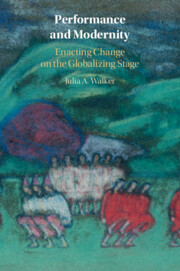Chapter 3 - The Nation-State
Eurhythmics and Bohemian Models of Affiliation
Published online by Cambridge University Press: 09 December 2021
Summary
After a year spent in Algeria, composer and music pedagogue Émile Jaques-Dalcroze returned to his native Switzerland, where he developed a series of movement exercises to help students learn the rhythmic and harmonic principles of (Western) music. Known as “eurhythmics,” the method drew from insights the former Paris bohemian discovered in the Arab music and Islamic mysticism he encountered in French-occupied Algiers. Chapter 3 demonstrates how eurhythmics gave visual form to both musical and social relations at the turn of the twentieth century, outlining a map of “social harmony” that helped consolidate group identities and affiliations. While Nazi pageants such as Rudolf Laban’s A Spring Wind and a New Joy (1936) modeled themselves after Jaques-Dalcroze’s own civic festivals to express the organic unity of a collective social body through uniform mass movements, other modernist works - such as W. E. B. Du Bois’s Star of Ethiopia pageant (1913, 1915, 1916, 1925), and the Ballet Russes’s Le Sacre du Printemps (1913) - set complex movement patterns on performers to enact both consensus and difference within a nationalizing body politic.
Keywords
- Type
- Chapter
- Information
- Performance and ModernityEnacting Change on the Globalizing Stage, pp. 106 - 159Publisher: Cambridge University PressPrint publication year: 2022



